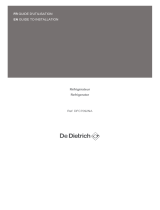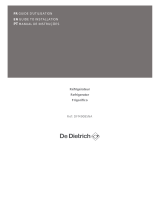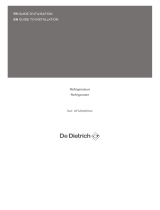Page is loading ...

Refrigerator
Ref: DRC771FNU
EN GUIDE TO INSTALLATION

EN
DEAR CUSTOMER,
Discovering De Dietrich products is experiencing unique emotions that only
valuable objects can produce.
The appeal is immediate at first glance. The quality of the design is
illustrated by the timeless aesthetics and the meticulous finishes that make
each object elegant and refined in perfect harmony with each other.
Then comes the urge to touch. De Dietrich design is based on robust and
prestigious materials; authenticity is favored.
By combining the most advanced technology with noble materials,
De Dietrich ensures the creation of high quality products at the service of the
culinary art, a passion shared by all kitchen lovers.
We wish you a lot of satisfaction in using this new appliance and will be
happy to receive your suggestions and answer your questions. We invite you
to express them to our customer service or on our website.
We invite you to register your product on www.de-dietrich.com to enjoy the
benefits of the brand.
Thank you for your confidence.
Find out all the information on the brand on:
www.de-dietrich.com
Important: Before switching on your appliance, please read this user guide carefully in
order to familiarise yourself more quickly with its operation.

SAFETY
This appliance complies with the European directives.
SAFETY GUIDELINES
For your safety and in order to use your appliance correctly, carefully read
these instructions (including the warnings and useful advice), before
installation and first use.
To avoid damaging the appliance and unnecessary injury, it is important
that the persons who use the appliance fully understand how it works and
the safety instructions.
Always keep these instructions close to the appliance so that they can
accompany it in the event of resale or a change of house. In this way, the
appliance will continue to function optimally and any risk of injury will be
avoided.
The manufacturer shall not be held liable in the event of misuse of the
appliance.
GENERAL SAFETY AND WARNINGS
This appliance is exclusively intended for domestic use in private
households. It may only be used in a roofed, enclosed and heated
environment such as a kitchen or any other room fulfilling these conditions.
Its use on shared or professional premises such as in an office or workshop
break room, a camp site building, or a hotel, etc., does not comply with the
use defined by the manufacturer.
WARNING! Keep your appliance away from any source of flame
during installation, servicing and use. The symbol in the margin
which is found on the rear of your appliance, means that there are
inflammable materials in this area.

The refrigerating and insulating agents used in this appliance contain
inflammable gases.
When transporting, installing and servicing the appliance, make sure that
none of the components of the cooling circuit are damaged. If the cooling
circuit is damaged:
Avoid naked flames and all sources of inflammation.
Ventilate the room in which the appliance is installed.
Installation safety
Maintain clear of obstruction ventilation openings in the appliance
enclosure or in the built-in structure.
It is dangerous to change the composition of this model in any way
whatsoever.
Ensure that the power cord is not trapped or damaged when you
position your appliance.
Any damage to the power cord may result in a short circuit and/or
electrocution.
If the power cord is damaged, it should be replaced by the manufacturer,
its after-sales service department or a similarly qualified person, so as
to avoid danger.
Do not place multiple plugs or portable power supply units behind the
appliance.
For models fitted with a water dispenser or an ice compartment, only fill
or connect using a supply of drinking water.
Safety of vulnerable persons

understood.
Children must not play with the appliance.
Children must not clean and maintain the appliance without supervision.
Children aged 3 to 8 are allowed to load and unload refrigeration
appliances.
Keep all the packaging materials out of the reach of children, as they
can cause suffocation.
Do not damage the refrigerating circuit.
Do not use any mechanical or other means, other than those
recommended by the manufacturer, to speed up the defrosting process.
Do not use any electric appliances inside the compartment for food,
unless they are of a type recommended by the manufacturer.
Do not store any explosive substances, such as aerosols containing
inflammable propellant gases, inside the appliance.
To avoid contaminating food, follow the instructions below:
Leaving the door open for long periods of time may significantly raise
the temperature in the appliance compartments.
Regularly clean any surfaces that may come into contact with food and
accessible drain systems.
Clean water containers if they have not been used for 48 hours. Properly
rinse the water distribution system connected to a fresh water network
if no water has been drawn off for five days.
Store raw meat and fish in the appropriate refrigerator compartments so
that the latter products are not in contact with other food and do not drip
onto other food.
The "two star" compartments for frozen foods are suitable for storing
food that is already frozen, for storing or making ice cream and ice
cubes.
The "one, two and three star" compartments are not suitable for freezing
fresh foods.

If the refrigerator remains empty for an extended period of time, switch
it off, defrost it, clean it, dry it and leave the door open to prevent any
mould from forming inside the appliance.

DISPOSAL
This symbol indicates that this product should not be treated as
household waste.
Only dispose of the appliance in certified collection centres.
Your appliance contains a large amount of recyclable material. It is marked
with this label to indicate the used appliances must be disposed of in
certified collection points.
Contact your town hall or your retailer for the used appliance collection
points closest to your home. This way, the appliance recycling organised
by your manufacturer will be done under the best possible conditions, in
compliance with European Directive on Waste Electrical and Electronic
Equipment.
This appliance’s packing materials are also recyclable. Help recycle it and
protect the environment by dropping it off in the municipal receptacles
provided for this purpose.
In accordance with the most recent legislative provisions applying to the
protection and respect for the environment, your appliance does not
contain any CFCs, but a refrigerant called R600a. The exact type of coolant
gas used in your appliance is clearly shown on the ID plate inside the fridge
part of your appliance, at the foot of the left-hand side panel. R600a is a
non-polluting gas that does not harm the ozone layer and hardly contributes
to the greenhouse effect at all.
Used appliances must be immediately made unusable.
Disconnect the power cord and cut it as close to the appliance as possible.
Inhibit the closing mechanism of the door or, even better, detach the door,
so that children or pets cannot remain enclosed inside the appliance when
playing.

ECODESIGN
To access the data on your model, stored in the product database in line with regulation (EU)
2019/2016 and data relating to energy labelling, please connect to the dedicated website at
https://eprel.ec.europa.eu/
Find the reference of your appliance on the website by entering the service reference shown on the
ID plate on your appliance.
Another way to access this information is to flash the QR code found on the energy label on your
product.
Layout and presentation of your appliance
• Your appliance was designed and tested to optimise its energy use.
• The proposed layout represents the ideal solution for achieving ideal energy consumption
and optimum food storage.
This illustration is only for hinting, the detail please check your appliance.
You can only keep your food in good condition and optimise your energy consumption by
following the instructions in this installation and user guide.

Energy-saving measures
In order to reduce the power consumption of your appliance:
• Install it in a suitable location (see "Installing your appliance").
• Leave the doors open for the shortest time possible.
• Never put hot food in the fridge or the freezer, and in particular soups and other preparations
that release a lot of steam.
• Check that your appliance is working correctly and do not allow too much ice to accumulate
in the freezer (defrost when the ice is more than 5-6 mm thick). Clean the condenser on a
regular basis.
• Regularly check the door seals and make sure that the doors can be closed properly. If this
is not the case, contact after-sales service.
• Do not adjust the temperature too low.
Storing food
Here are some rules you should follow:
• Maintain the cold chain and select "Booster" mode at least 6 hours before coming home with
groceries (if your model has it).
• Clean the refrigerator part at least once a month (see Care and cleaning)
• Keep home-made food in the refrigerator after first taking care to leave it to cool.
• Make sure that your appliance is set to the recommended temperatures shown below. The
temperatures for every compartment are recommended to optimise storing food and avoid
any waste.
Area Type of compartment Recommended
temperature
Fresh food
compartments
Fresh food compartment (refrigerator) +4°C
Frozen food
compartments
0 star compartment (depending on model) 0°C
1 star compartment (depending on model) -6°C
2 star compartment (depending on model) -12°C
3 star compartment (depending on model) -18°C
4 star freezer drawers/shelves (depending on
model)
-18°C

• Place the food in the locations recommended in the tables below.
Fresh food compartments
Refrigerator
compartments Type of food
Refrigerator door
and door racks
Jams, drinks, eggs, condiments.
Do not place perishable fresh food in these areas
Crisper Lettuce, fruit, vegetables, herbs
Do not put bananas, onions, potatoes or garlic in the refrigerator.
Lower shelf
Raw meat, fish, highly perishable food.
Intermediate shelf
Milk products
Top shelf
Cold cuts, prepared meals, meals to reheat
Frozen food compartments (compartments available depending on model)
Freezer
compartments
Logos &
Markings Type of food
0 star
compartment
To store sorbet for a few hours and make ice cubes.
This compartment is not suitable for freezing fresh food.
1 star
compartment
To store frozen products for a few hours and make ice
cubes.
This compartment is not suitable for freezing fresh food.
2 star
compartment
To store frozen products for a few days, make ice cream
and ice cubes.
This compartment is
not suitable for freezing fresh food.
3 star
compartment
To store frozen products for a few weeks/months and
make ice cubes.
This compartment is not suitable for freezing fresh food.
4 star freezer
drawers/shelves
To freeze food and store:
- Meat, fish (lower drawer/shelf).
- Vegetables, chips (intermediate drawer/shelf).
- Ice cream, fruit, ready-made dishes (upper
drawer/shelf)

INSTALLATION
Care before installation
Before installing the appliance and connecting it to the power, wash the interior and all internal
accessories with lukewarm water and some neutral soap so as to remove the typical smell of a
brand new product, then dry thoroughly.
Never use detergents or abrasive cleaners, they will damage the inside coating.
When using the appliance for the first time or after a period of non-use, before putting the food in
the compartment let the appliance run at least two hours on the higher settings.
Location
Warning! Never expose the appliance to a naked flame.
• Install the appliance in a dry and well ventilated place.
• The appliance should be located far from heat sources like radiators, boilers, sunlight, etc.
• Your appliance is designed to function optimally at a given ambient temperature. In this case, it
is said to be designed for a particular "climate class". The climate class is clearly shown on the
ID plate (see the "Contact" chapter). The refrigerator may not maintain satisfactory inside
temperatures if it operates outside of the temperature limits set for the "climate class" it is
designed for. Ensure that the chosen location is compliant with these temperature limits:
Class
Ambient temperature
SN
This refrigeration appliance is designed for use at ambient temperatures between
10°C and 32°C
SN-ST
This refrigeration appliance is designed for use at ambient temperatures between
10°C and 38°C
SN-T
This refrigeration appliance is designed for use at ambient temperatures between
10°C and 43°C
N
This refrigeration appliance is designed for use at ambient temperatures between
16°C and 32°C
ST
This refrigeration appliance is designed for use at ambient temperatures between
16°C and 38°C
T
This refrigeration appliance is designed for use at ambient temperatures between
16°C and 43°C
• Based on the above, avoid locating your appliance on balconies, verandas, terraces, in garages,
etc. Excessively high temperature in summer and excessively low temperatures in winter can
prevent it from functioning properly and therefore properly conserving food.
• Appliance levelling is achieved by adjusting one or more adjustable feet located under the unit
(refer to the "Levelling the appliance" section).
If your appliance is fitted with casters, then remember that they should only be used for short
movements. Do not move the appliance over long distances on its casters.

How to reverse the door
• Ensure the unit is unplugged and empty.
• To take the door off, it is necessary to tilt the unit backwards. You should rest the unit on
something solid so that it will not slip during the door reversing process.
• All parts removed must be saved to do the reinstallation of the door.
• Do not lay the unit flat as this may damage the coolant system.
• It’s better that 2 people handle the unit during assembly.
Refer to the drawing below

Installation
Kits for installation
*Depending on models
Tools needed
*
*

Installation instructions

1. Ensure the size of cabinet is enough for proper ventilation.

2. Install the side cover gasket on the side where the door opens, to close the gap between
the appliance and the wooden cabinet. Attach the top cover bracket to the appliance.
*Depending on models
*
*
*
*
*
*

3. Carefully slide the appliance into the cabinet. Make sure the opening side of the door is as
close as possible to the cabinet wall.
*Depending on models
*
*

4. Do not plug in the appliance. Fix the top cover bracket and feet to the cabinet.

5. Screw a guide into the holes on the appliance side. Insert the sliding rail into the guide and
screw it to the door. Unscrew the guide to screw the last screw of the sliding rail to the door.
Then attach the sliding rail cover to the sliding rail.
Screw the guide back onto the unit by inserting the slide.
Above the freezer compartment, on the left side of the appliance, remove the covers and
screw a side fixing on it. On the right side, unscrew the hinge screws and screw the side
fixing on it.
Finally, attach the side fixing to the door.

Levelling the appliance
Choose a place to install the refrigerator on a flat surface.
If the appliance is not level, the doors will not be correctly aligned and
compartment sealing will not be ensured.
Electrical connections
Warning! It must be possible to unplug the appliance from the mains power, so
the plug must remain easy to access after installation.
• The electric connections must meet the applicable standards and be capable of withstanding
the maximum power shown on the ID plate.
• The power plug must be easily accessible and out of the reach of children.
• For your safety this appliance must be earthed. If the power plug is not earthed, consult a
qualified electrician to connect your appliance in line with applicable regulations.
• Do not use extensions, adapters or multiple plugs.
• Do not place multiple plugs or portable power supply units behind the appliance.
The manufacturer declines all liability if the above-mentioned safety precautions are not complied
with. If in doubt, refer to your reseller.
/










